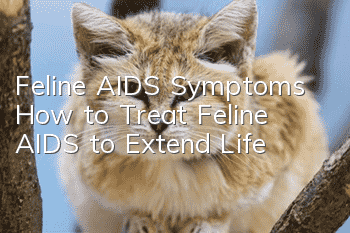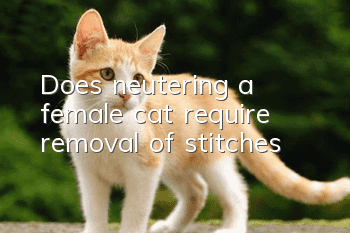Feline AIDS Symptoms How to Treat Feline AIDS to Extend Life

Feline AIDS symptoms include: swollen lymph nodes, fever, anemia, diarrhea, weight loss, loss of appetite, etc. In severe cases, eye abnormalities or inflammation (conjunctivitis), gum inflammation (gingivitis), skin redness or hair loss may occur. , sneezing, discharge from the eyes or nose, frequent urination and abnormal behavior.
Feline AIDS symptoms
Cats infected with feline AIDS generally do not show any symptoms for many years. However, once symptoms appear, the function of the cat's immune system will decline, leading to various secondary infections. The main symptoms of cats infected with feline AIDS are: swollen lymph nodes, fever, anemia, diarrhea, weight loss, loss of appetite, eye abnormalities or inflammation (conjunctivitis), gum inflammation (gingivitis), skin redness or hair loss, and sneezing , discharge from eyes or nose, frequent urination and abnormal behavior, etc.
How to detect feline AIDS
The most common test for FIV is to detect the presence of antibodies to the virus in the blood. Without proper treatment, cats with FIV may develop various cancers, blood disorders, or kidney failure, which can ultimately kill the cat.
How to care for feline AIDS
Although it is impossible to predict how long a cat infected with FIV will survive, if managed appropriately, cats infected with FIV can live a normal life span.
1. Once your cat is diagnosed with FIV disease, be sure to keep your cat indoors and away from other cats that may be infected;
2. Take your cat to the veterinarian at least twice a year for health checkups, including blood tests and urinalysis; pay special attention to the health of gums, eyes, skin and lymph nodes;
3. Measure the cat’s weight frequently and record it, as weight loss is usually the first sign of deterioration;
4. Provide them with a nutritionally balanced diet and avoid eating uncooked food, such as raw meat and eggs, and unpasteurized dairy products, to reduce the risk of food-borne bacterial and parasitic infections;
p>5. Neuter the cat.
6. In order to prevent cats with FIV disease from spreading the virus to other uninfected cats, indoor cleaning and disinfection should be done well, and food and water dishes, bedding, garbage dishes and toys should be replaced in a timely manner.
7. A dilute solution of household bleach is an excellent disinfectant. It is also recommended to use suitable cleaning agents for carpet cleaning and floor mopping.
8. Any new cat or kitten should be protected against other infectious pathogens before entering the home.Get properly vaccinated.
- What should I do if my cat has entropion of eyelids? About the correction of cat’s entropion of eyelids!
- What is the personality of a Somali cat?
- Why do Maine Coon cats need to be neutered?
- How to quickly teach a cat to use cat litter?
- Can cats drink the milk cap on milk tea?
- How to tell if a blue cat is pregnant
- What to do if your cat has a fever
- Symptoms of wound infection in male cats after sterilization
- What should I do if my cat likes to scratch the curtains?
- What should I do if there are cat hair everywhere in my house?



